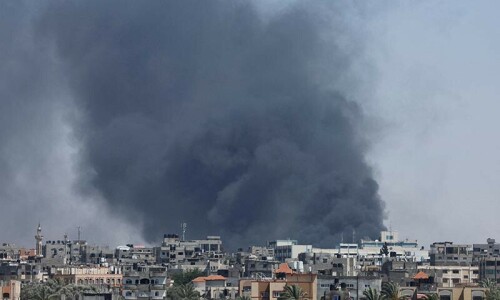SIMFEROPOL: The European Union and the United States on Monday slapped sanctions on top Russians and Ukrainians deemed responsible for a breakaway vote in Crimea that has fanned the worst East-West standoff since the Cold War.
Official results from Sunday's disputed referendum showed 96.77 per cent of voters in the mostly Russian-speaking region of Ukraine had opted for Kremlin rule in what would be the most radical redrawing of the map of Europe since Kosovo's 2008 declaration of independence from Serbia.
Crimea's lawmakers on Monday formally asked to join Russia and vowed to disband Ukrainian military units stationed across the peninsula.
Crimea has been under effective control of Russian troops and pro-Kremlin militia since the start of the month.
Kiev and the West consider the secession vote to be illegitimate and the reaction from Brussels and Washington was both swift and tough.
EU foreign ministers unveiled travel bans and asset freezes against 13 Russian officials and eight Ukrainian officials from Crimea.
The 28-nation bloc did not name those sanctioned but Lithuanian Foreign Minister Linas Linkevicius tweeted there would be “more EU measures in (a) few days”.
The 21 were officially targeted “for undermining the sovereignty of Ukraine”.
The EU's punitive measures were followed minutes later by a White House announcement that it was imposing financial sanctions on seven top Russian government officials and lawmakers in reprisal for the Kremlin's incursion.
“We have been guided by a fundamental principle,” US President Barack Obama said at the White House.
“The future of Ukraine must be decided by the people of Ukraine. That means Ukraine's sovereignty and territorial integrity must be respected and international law must be upheld.”
The White House said Ukraine's ousted pro-Kremlin president Viktor Yanukovych and Crimea's self-declared premier Sergiy Aksyonov were both on the US list.
The Russians targeted include upper house of parliament speaker Valentina Matviyenko and Deputy Prime Minister Dmitry Rogozin, responsible for overseeing Russia's military and industrial sector.
“These are clearly people who are very close to President (Vladimir) Putin,” said one US official on condition of anonymity.
A second US official called the steps “by far the most comprehensive sanctions applied to Russia since the end of the Cold War.”Those listed will see any assets and interests in the United States or under US jurisdiction blocked.
They will also be banned from doing business with Americans and will find it difficult to make financial transactions using dollars.
US officials noted that the government had not taken what would have been the extraordinary step of personally sanctioning Putin.
Rogozin, a former Moscow envoy to Nato who is known for his hawkish views of the West, ridiculed the US manoeuvres.
“I think some prankster prepared the draft of this Act of the US President,” Rogozin tweeted in English.
The Western allies have tried to put up a united front against Putin's perceived attempts to stamp his authority on post-Soviet regions he views as part of Moscow's historic domain.
Diplomats in Brussels also said EU and Ukrainian leaders would on Friday sign the political portion of a landmark pact whose rejection by Yanukovych in November sparked protests that led to his February 22 fall.
'Great farce'
Most of the international community has rejected the Crimea referendum as illegal because Russia had vowed to respect its neighbour's territorial integrity under a 1994 agreement that saw Ukraine renounce its Soviet-era nuclear arms.
Ukraine said it was recalling its ambassador to Moscow for consultations “given the situation around Crimea and the need to discuss certain international aspects of this crisis.”
But the undaunted government of Crimea took several decisive steps aimed at permanently severing it ties with Kiev, including seizing Ukrainian institutions and even plans to set the peninsula's clocks two hours forward to put it on Moscow time.
Ukraine's interim president Oleksandr Turchynov denounced the vote as a “great farce” and watched from a podium as agitated lawmakers approved a partial mobilisation of the army.
Putin has signalled he has no intention of turning back on what he describes as his defence of ethnic Russians who, according to Moscow, have come under increasing attack from Ukrainian ultra-nationalists since last month's ouster of Yanukovych by a more nationalist but Western-leaning team.
Putin on Tuesday will make a special address on the crisis that will be attended by lawmakers from Russia's two houses of parliament. Crimea's self-declared leader Aksyonov also said he was flying to Moscow Monday for talks.
Russia's lower house of parliament is expected to debate legislation on Friday simplifying the process under which the Kremlin can annex another part of a sovereign state.











































